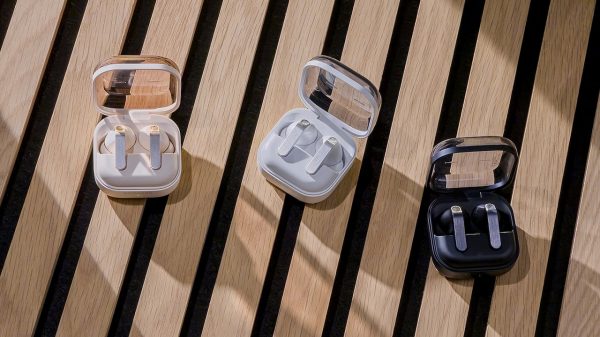Samsung Electronics Ltd., the worldwide digital consumer electronics and information technology leader, has introduced the world’s first 1.8-inch hard drive with a 60GB(1) per disk capacity and a super-slim form factor that is just 5-millimeters tall. Samsung’s sleek new 1.8-inch N-series features 20GB, 30GB, 40GB and 60GB per disk capacities — the largest one-disk storage capacity offered by any drive on the market today. Samsung’s 1.8-inch N-series is currently shipping.
Samsung’s new 60GB 1.8-inch hard disk can store data equivalent to 60 135-minute movies, 1,500 40MB music videos, or 15,000 4MB MP3 music files. Samsung’s 1.8-inch N-series hard disk drives are available in both internal and external HDD type.
Until now, two disks were required to reach a 60GB storage capacity in a 1.8-inch drive, which increased the height and size of the drive. Samsung’s N-series utilizes perpendicular magnetic recording (PMR) technology to offer 60GBs on a single disk. As a result, Samsung is the first to offer a 60GB solution in the slimmest available 5-millimeter form factor. This makes the drive ideal for use in small portable media centers and mobile music devices.
Samsung’s 1.8-inch drives respond to the increasing demand for added capacity in smaller and smaller PC, mobile, and consumer electronics applications. Samsung’s N-series supports PATA(ZIF) as well as the new CE-ATA interface specifically designed for hard drives used in consumer electronics, MP3 players, portable media players, notebook PCs, UMPCs, car navigation systems, GPS and other digital consumer applications.
“Samsung is offering cutting-edge technology from an aerial density standpoint with the new 1.8-inch N-series. Given the same amount of hard drive space, Samsung is able to offer 60GB per disk where our competitors can only offer 40GB,” comments Albert Kim, national sales manager, Storage Systems for Samsung Semiconductor. “This enables us to produce more compact hard drives that will fit into smaller, more portable electronic devices.”
Samsung’s 1.8-inch hard drives are among the quietest on the market today, with just 1.8 Bel, a measurement of sound. As the sound level detectable by the human ear is 2 Bel, this makes the operating sound of the new drives undetectable to the human ear. In addition, the N-series features ultra-low power consumption that is just .3 watts in low power idle.
Samsung’s N-series utilize PMR technology to achieve such a high level of storage capacity per disk. Unlike traditional longitudinal recording technology, which lays data bits end to end where they can flip and corrupt data on the disc, PMR technology places the data bits perpendicular to the disc, which reduces the corruption factor. In addition, by placing the data bits standing on end, more data can fit onto a disc, allowing for greater storage capacity.
Samsung’s 1.8-inch drives feature an ultra low power mobile SoC, a quiet and robust platform design, fast drive ready time, high efficient hybrid latch system, shock sensor and free fall sensor which is optional. All are equipped with a 4,200-rpm spindle speed, and 7.14-millisecond average seek time and a 2MB data buffer.
For more information about Samsung’s hard disk drive products, visit http://www.samsung.com.
About Samsung Electronics
Samsung Electronics Co., Ltd. is a global leader in semiconductor, telecommunication, digital media and digital convergence technologies with 2005 parent company sales of US$56.7 billion and net income of US$7.5 billion. Employing approximately 128,000 people in over 90 offices in 51 countries, the company consists of five main business units: Digital Appliance Business, Digital Media Business, LCD Business, Semiconductor Business and Telecommunication Network Business. Recognized as one of the fastest growing global brands, Samsung Electronics is a leading producer of digital TVs, memory chips, mobile phones, and TFT-LCDs. For more information, please visit http://www.samsung.com
(1)Actual accessible capacity may differ due to formatting and partitioning of the hard drive, as well as due to your computer’s operating system.























